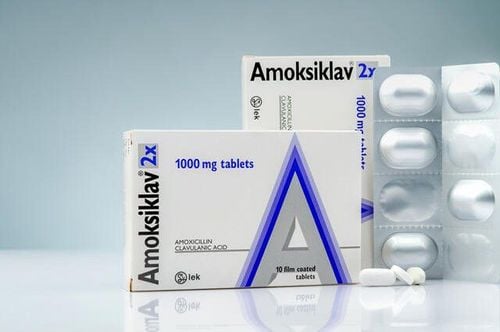Amoksiklav is often indicated for the treatment of bacterial infections, such as respiratory infections, abdominal infections, osteoarthritis,...
1. What is Amoxiclav?
Amoxiclav is an antibiotic that can kill bacteria that cause infections. The drug is prepared in the form of film-coated tablets, packaged in boxes of 2 blisters x 5 tablets. For Amoxiclav 625mg, there will be the following specific active ingredients:
- Main active ingredients: Amoxicillin (trihydrate salt) 500mg and Clavulanic acid (clavulanate potassium salt) 125mg.
- Other excipients: Crospovidone, Colloidal silicon dioxide, Crosslinked carboxymethylcellulose sodium, Microcrystalline cellulose, Magnesium stearate, Ethylcellulose, Hydroxypropylcellulose, Titanium dioxide, Polysorbate, Talc and Triethylcitrate.
In addition, Amoksiklav is also available in larger doses. Specifically, Amoksiklav 2x 1000mg or Amoksiklav 1g (box of 10 tablets). Each tablet contains Amoxicillin in the form of amoxicillin trihydrate with a dose of 875mg and Clavulanic Acid in the form of potassium clavulanate with a dose of 125mg, in a 7:1 ratio.
2. Indications and contraindications for using Amoxiclav
2.1. Indications for using Amoxiclav
Amoxiclav 625mg is an antibiotic with bactericidal properties, often prescribed for both children and adults to treat the following infections:
- Respiratory tract infections, gynecological, urinary, soft tissue, skin.
- Abdominal infections or postoperative abdominal infections.
- Postoperative infections or septicemia.
- Bone and joint infections or dental infections.
- Sinus or middle ear infections.
- Gram (-) and Gram (+) infections, anaerobic bacteria sensitive to the drug.
- Gonorrhea or chancroid.
- Cholangitis, peritonitis, osteomyelitis, insect bites, and cholecystitis.
- Prophylaxis of surgical infections.
2.2. Contraindications for the use of Amoksiklav
Amoksiklav should not be used in the following cases:
- Patients with a history of allergic reactions to Clavulanic Acid,
- Amoxicillin, Penicillin, or any other active ingredients in the medication.
- Individuals who have had a severe allergic reaction or hypersensitivity to any antibiotics, with symptoms such as facial swelling, skin rash, or swelling of the neck.
- Individuals with a history of liver dysfunction or jaundice when using antibiotics.
- Patients with infectious mononucleosis or lymphocytic leukemia.
3. Dosage and instructions for the use of Amoxiclav
3.1. Dosage of Amoxiclav
The dosage of Amoxiclav will be determined specifically based on the age and health status of the patient, including:
- Adults and children 12 years of age and older (weighing about 40kg): Take the usual dose of one 625mg tablet x 2 times/day for mild infections, and take one 1000mg tablet x 2 times/day for severe infections.
- Amoxiclav is not recommended for children under 12 years of age due to a lack of specific safety data.
- Dosage for treating dental infections: Take 625mg x 2 times/day, continuously for 5 days.
- The maximum daily dose of Clavulanic Acid (as Potassium salt) is 600mg for adults and 10 mg/kg body weight for children. Meanwhile, the maximum daily dose of Amoxicillin for adults is 6g and for children is 45mg/kg of body weight.
3.2. Instructions for Use of Amoksiklav
When using Amoksiklav, patients should swallow the whole tablet with a full glass of water before starting a main meal. The tablet is divided by a score line, making it easier for patients to take the medication.
Patients should take Amoksiklav in evenly spaced doses throughout the day, with each dose separated by at least 4 hours, and avoid taking 2 doses within the same hour. Additionally, do not take Amoksiklav for more than 2 weeks. If there are no signs of improvement in the infection, patients should consult a doctor to investigate the cause.
3.3. Management of Overdose or Missed Dose of Amoksiklav
* In the case of Amoksiklav overdose:
If an overdose of Amoksiklav is taken, patients may experience discomfort in the stomach (such as diarrhea, nausea, or vomiting) or seizures. If any of these symptoms occur after an overdose, the patient should immediately inform their doctor for appropriate management.
*In case of a missed dose of Amoxiclav:
If you miss a dose of Amoxiclav, you should take it as soon as you remember. However, avoid taking the next dose too soon, but wait about 4 hours before taking the next dose.
4. Some side effects of Amoxiclav
During the use of Amoxiclav 625mg or 1g, patients may experience some of the following side effects:
- Digestive disorders, and diarrhea in both adults and children (Very common).
- Oral thrush (yeast infection of the vagina, in skin folds, or in the mouth).
- Stomatitis, pseudomembranous enteritis with severe diarrhea, vaginitis, cholestatic jaundice, or hepatitis.
- Feeling nauseous, especially when taking the drug at high doses.
- Allergy, bronchospasm, Quincke's edema, or anaphylactic shock.
- Thrombocytopenia, leukemia or eosinophilia.
- Severe diarrhea with blood in the stool, white stool, cloudy urine, yellow eyes, indigestion, pain, or urinating less than usual (should stop taking the drug).
When encountering any of the symptoms mentioned above, patients need to quickly go to the nearest clinic or medical facility for diagnosis and treatment.
5. Important Considerations When Using Amoksiklav
Patients should discuss with their doctor before using Amoksiklav if they have any of the following conditions:
- Having a fever
- Have a history of allergies.
- Are undergoing treatment for kidney or liver issues, such as liver/kidney dysfunction or liver/kidney failure.
- Have cholestatic jaundice, mononucleosis, or leukemia.
- Have a history of facial rashes, laryngeal swelling, or frequent shortness of breath after taking any medications.
- Have asthma.
- Have a false positive result in urine or blood tests.
- Are using potassium-containing medications.
- Have phenylketonuria.
- Rarely require fluid infusion.
During the use of Amoksiklav, patients should also be cautious of the following:
- The doctor may perform tests to identify the specific bacteria causing the infection and prescribe the correct medication.
- Amoksiklav may worsen some existing health conditions and even cause severe side effects, including seizures, allergies, and colitis.
- The medication may affect blood test results (e.g., liver function tests or red blood cell status) and urine tests.
- If the patient is pregnant, suspects pregnancy, plans to become pregnant, or is breastfeeding, they should inform the doctor for specific advice before deciding to use the medication.
Amoksiklav may interact with the following medications:
- Gout medication (Allopurinol), which may increase the risk of allergies.
- Probenecid (the doctor may adjust the Amoksiklav dosage).
- Anticoagulants like Warfarin.
- Cancer or rheumatism medications like Methotrexate.
- Immunosuppressants such as Mycophenolate mofetil.
To minimize the risk of drug interactions, patients should inform their doctor about any medications they are currently taking. This includes non-prescription drugs, prescription drugs, health supplements, herbs, or multivitamins. The doctor can review and evaluate the risk of drug interactions to make a decision on adjusting the dose or replacing the patient with a new medication.
To ensure that Amoxiclav is of the best quality and does not spoil, patients should follow these storage instructions:
- Store the medicine in a cool, dry place and avoid high humidity.
- Store the medicine in a high place, out of sight and reach of children.
- Avoid using the medicine after the expiry date printed on the label.
- Store the medicine in the original packaging to ensure that the medicine does not get moldy or come into contact with agents that can damage the medicine.
To achieve high treatment effectiveness and minimize the risk of side effects, patients need to follow the instructions for taking the medicine as recommended by their doctor.
To arrange an appointment, please call HOTLINE or make your reservation directly HERE. You may also download the MyVinmec app to schedule appointments faster and manage your reservations more conveniently.













